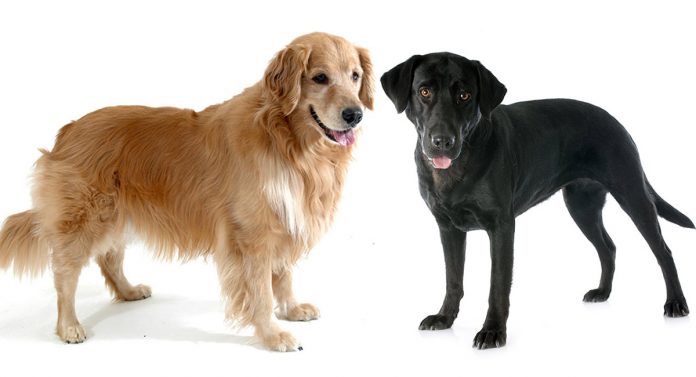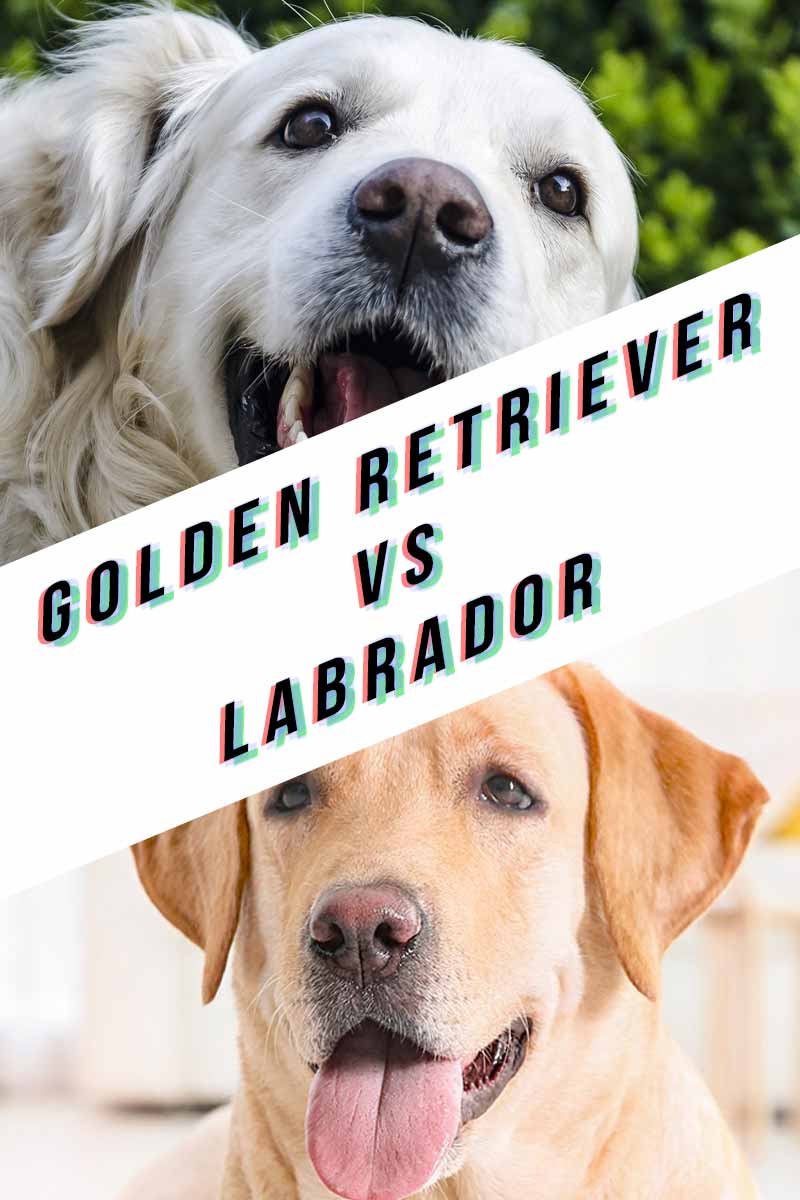Golden Retriever vs Labrador breed traits are surprisingly similar. Both dogs are family friendly, active, intelligent and affectionate. But there are some ways to tell the two sweet natured, floppy eared, webbed pawed dogs apart.
Golden Retriever grooming is a bigger deal, with their longer coats, though both breeds are high shedders, and neither is hypoallergenic. Goldens are all shades of gold, from cream to red, but the Lab comes in black, chocolate and yellow, as well as some dilute hues. The Lab is also a bit more lively and has higher prey drive than the Golden Retriever, but there are some Golden Retriever health problems that trump Labrador issues!
- The differences between a Golden Retriever and Labrador Retriever
- Golden Retriever vs Labrador size
- Grooming and shedding comparisons
- The difference between temperaments
- Golden Retriever vs Labrador health
Finding the right breed for your family can be tough, even when you’ve narrowed it down to a pretty great shortlist of two very similar dogs. Golden Retriever vs Labrador? Labrador vs Golden Retriever? It’s a conundrum! But we are here to help you choose between these similarly wonderful breeds. Because although it’s hard to go wrong with either breed, there are differences between the two that can help you decide.
Historical Differences
The Golden Retriever can trace its ancestry back to the 1800s, when the founder of the breed, Lord Tweedmouth, crossed a Wavy Coated Retriever with a Tweed Water Spaniel in Scotland. The result of this original cross breeding (and later modifications) is the Golden Retriever, a dog famous for its devoted, big-hearted personality and rich golden coat.
The Golden was bred to be a sporting dog. This means that it is adept at finding and retrieving birds and other game brought down by hunters. As a Retriever, the Golden is bred for a soft, gentle mouth and an obedient, highly trainable temperament. Like other Retriever breeds, they were often used to retrieve waterfowl, and still retain their love of water.
Golden Retrievers can vary in appearance depending on where they were bred. There are differences in British, American, and Canadian Goldens. The British type is generally larger and more muscular than the other two. There are also some coat variations among the three types too.
The Labrador Retriever
When it comes to sheer numbers, the Lab has ranked #1 in popularity among all dog breeds for many years. The Labrador was first developed in Newfoundland Canada from other local dogs like the St. John’s Water Dog. The Lab was used as a working water dog, to help fishermen retrieve nets and haul gear.
Their love of water and expert retrieving ability made them ideal waterfowl retrievers for hunters who brought the breed to the U.S. and U.K. But these days there are two different types of Labrador Retriever. They are the American (or Working) Lab and the English (or Show) Lab. They differ in both looks and temperament.
The American type Labrador Retriever is sensitive, intelligent, and active. The English type is generally larger, calmer, and less energetic than its American counterpart. Although it can also be a little sillier! Both types of Lab are famously friendly, playful, and outgoing.
Besides being a popular family pet, they are also frequently trained as service dogs. As are Golden Retrievers, and Golden Lab mixes too! So as you can see the Golden Retriever vs Labrador histories are fairly similar in terms of their working purpose. But although they have quite similar histories, what about their stature?
Golden Retriever vs Labrador Size
Both Golden Retrieverss and Labs are popular choices for people interested in medium to large sized dogs. Males tend to be larger than females, and height is measured at the tallest point on the body—the shoulder blades or “withers”—and not the head.
Generally, at an average of 24 inches tall and 75lbs, the Lab is a slightly larger dog than the Golden, who istypically just half an inch and 5lbs lighter.
While breed standards are exacting for show quality dogs, remember that a pet quality dog can be larger or smaller than the breed standard, depending on the individual animal. The overall body type of Golden vs Lab reflects the size difference between the two breeds. The proportions of the Golden tend to be elegant and symmetrical. Labs are generally more solid and sturdy than overly refined.
Labrador vs Golden Grooming
Coat type, grooming requirements, and amount of shedding often play a large role in the Golden Retriever vs Labrador decision making process. Many people think Labs require less maintenance. Is this true? Let’s look at the coat types and grooming needs of both breeds.
The Golden Retriever has a medium length double coat, consisting of a water repellant top coat and a soft undercoat. They have longer feathering fur on the neck, legs, and tail. They are sometimes bred for longer, silkier coats than what is described in the breed standard. Many owners like soft, flowing coats while breed purists say that as hunting dogs, should have more moderate coats.

All Golden Retrievers, regardless of coat length and texture, require regular grooming. The undercoat grows denser in cold weather and sheds in warm weather. Use of an undercoat rake can help remove loose fur from the undercoat. For the top coat a good quality slicker brush is a must-have. Some also like steel tooth combs.
I recommend brushing these long haired lovelies at least twice a week. This also involves trimming some of the longer fur with scissors, specifically thinning shears. Areas that require regular trimming with scissors include the ears, feet, neck, and tail. The coat of a Golden Retriever should never be shaved.
Besides maintaining the coat, basic grooming needs for a Golden also include baths, nail trimmings, and ear and teeth cleaning. Remember that drop eared dogs are prone to ear infections. So how does Golden Retriever grooming compare with Labrador Retriever grooming?
Grooming a Labrador Retriever
Like the Golden, the Labrador also has a double coat. It consists of a soft undercoat that protects the dog in cold weather, and a top coat that is shorter in length than the Golden’s. Also like the Golden Retriever, the Lab does shed its undercoat in warm weather.
Labs don’t have the feathery furnishings and don’t ever need trimming. However, while their coat length is short, they do have a double coat that needs maintenance.
Labs require an undercoat rake to remove the dead hair from the undercoat. You can then use a slicker brush for an overall grooming.
Nail trimming and ear cleaning should also be a regular part of your grooming routine. Labs generally need to be bathed less frequently than Goldens, although if they are a fan of rolling in muck this can ramp up. In non shedding season Lab’s coats are less maintenance than Goldies’.

Golden Retriever vs Labrador Shedding
Both Labs and Goldens have double coats consisting of a top coat and an undercoat. The undercoat will shed in warmer weather in both breeds, but does one dog shed more than the other?
Golden Retrievers can shed quite a bit all year round. If you’ve ever petted a golden retriever while wearing black trousers, you will be able to attest to this. Besides normal, everyday shedding, their undercoat grows thicker in the winter and sheds in the spring. This warm weather shedding is often called “blowing the coat” — a very descriptive term for the extensive seasonal Golden shedding!
The best way cope with shedding in a Golden is with a good brushing every few days; once weekly brushing may not be adequate. Besides regular brushing, your dog will need regular grooming sessions with an undercoat rake, especially during shedding season.
When you first start using an undercoat rake, you may be surprised at the huge amount of dead fur that will be removed from your dog’s coat. Don’t panic! This will only be at the beginning. Once you start doing it regularly, a once weekly raking should be fine. Grooming your Golden outdoors can be a good way to reduce the amount of hair in the house. And remember to never shave a Golden Retriever’s coat. How does Golden Retriever vs Labrador shedding compare?
Labrador Retriever shedding
Labs shed as much as, if not more than, the average dog. While the outer coat is short, it’s the undercoat that experiences a big seasonal shedding in warm weather. You will often hear Lab owners refer to this as blowing the coat, just like in Golden Retriever’s.

Fur in the house can be controlled by outdoor grooming sessions. So Golden Retriever vs Labrador shedding is similar, but Goldens usually require more day to day grooming. Their long hairs also show up more when they do shed than the black or chocolate Lab, due to their light color. Neither of them are low shedding dogs.
Golden Retriever vs Labrador Colors
The Labrador Retriever breed standard recognizes three solid coat colors: black, yellow, and chocolate. No other color variations are acceptable in show quality Labs. The yellow and chocolate colors can both vary in shading from light to dark.
Golden Retrievers are, of course, golden in color. The breed standard describes it as a rich, lustrous golden that can vary from dark to light, although very light and very dark are not accepted in show quality dogs. Some have lighter colored fur on the areas where the coat is long and feathery, such as the tail, neck, and legs.
Yellow Labs and Goldens can have very similar coat coloring, but their coat types will be true to breed.
Comparing Temperament Traits
The words commonly used to describe the temperaments of both Goldens and Labs are the words we use to describe very good dogs! Both breeds are friendly, reliable, affectionate, gentle, trusting, and kind. But many potential owners wonder about the differences between Lab and Golden Retriever personalities.
Before talking about temperament, it’s always a good idea to remind new dog owners that all dogs are individuals, and breed alone does not guarantee any specific personality traits or behaviors. Meeting the parents, good training and socialization practices from puppyhood into adulthood are the best ways to ensure that you get the kind of dog you want.
Labs and Golden Retrievers are both very trainable and obedient, which is good news for novice owners. Canine behavior experts explain the minor temperament differences between Goldens and Labs in terms of degrees. Generally, Golden Retrievers are said to be a bit softer, gentler, and more sensitive than Labs.
While both do well in families with children, Labs tend to have the advantage in adapting to households with boisterous, lively, and loud young children. Many Golden Retrievers prefer a slightly more calm and tranquil home environment.
It’s always important to take your lifestyle into account when choosing a dog…both the breed and the individual animal. An active family with young children may prefer an energetic Lab, while a retired couple may welcome a gentle Golden instead.
Health Problems in Golden Retrievers and Labradors
Like most purebred dogs, both breeds can suffer from inherited health problems. What are the main health issues potential owners should know about in both breeds? Here’s the rundown on Golden Retriever vs Labrador health problems.
Genetic Diseases
Golden Retrievers can suffer from hip and elbow dysplasia, as well as eye and heart problems. Labs also can be prone to hip and elbow dysplasia, eye disease, and a condition known as exercise induced collapse.
Cancer
One important genetic health issue potential Golden owners need to know about is the breed’s increased risk for cancer. Approximately 60% of them will develop cancer at some point in their lives. The cancer incidence rate in US jumped in the 1990s, suggesting a recent genetic mutation.
The Golden Retriever Lifetime Study is an important long-term project that studies cancer in Goldens. Researchers have made great progress in understanding the genetic and environmental risk factors for cancer.
Two types of cancer are especially common in Golden Retrievrs: hemangiosarcoma (cancer of the blood vessel walls, affecting the spleen and heart) and lymphoma (cancer of immune system cells, affecting lymph nodes, liver, and spleen).
Obesity
Labrador Retrievers are at an increased risk for obesity compared to other dog breeds. Recent genetic research, led by the GOdogs project at Cambridge University, has found a genetic mutation that affects appetite and obesity in Labradors and Flat-Coated Retrievers.
A variant of this gene, called POMC, is present in one quarter of all U.K. Labradors. Dogs with 2 copies of the gene are on average 4 kg heavier than non-carriers. The affected dogs also score higher on food motivation tests. Weight management is important for all dogs, but especially for breeds at higher risk for obesity.
Is One Healthier Than The Other?
When looking at Golden Retriever vs Labrador health as an overall picture, the Labrador probably comes out on top. The high risk problems in Labs are often avoidable through health testing.
Good hip and elbow scores, PRA clear DNA test and a recent eye test will help you to find a health puppy. With Goldies these tests still need to be carried out, but there is the added life limiting risk of cancer.
 Golden Retriever vs Labrador As Pets
Golden Retriever vs Labrador As Pets
Both Labradors and Goldens rank high on most people’s lists of the ideal dog to add to their family. It’s no accident that the Lab has been the most popular dog breed in the U.S. for the past 26 years, and the Golden is not far behind.
If you are looking for an energetic, intelligent, and outgoing dog to keep up with your active lifestyle, particularly if you have children, the Lab might be the perfect dog for you. You will have to watch their weight, and make sure that you get your puppy from fully health tested parents.
If a loving, kind, and gentle dog is more your speed, be sure to consider the Golden. Golden Retrievers also need fully health tested parents, but there is the added risk of cancer in Golden Retrievers to consider.
This is something you can’t avoid through health testing, but might be helped by choosing puppies with older parents and no family history of cancer.
Can’t decide? Then maybe a Goldador is what you are really looking for!
References
- Simpson, M., Searfoss, E., Albright, S., et al. “Population Characteristics of Golden Retriever Lifetime Study Enrollees.” Canine Genetics and Epidemiology, 2017.
- Raffan, E., Dennis, R.J., O’Donovan, C.J., et al. “A Deletion in the Canine POMC Gene Is Associated with Weight and Appetite in Obesity-Prone Labrador Retriever Dogs.” Cell Metabolism, 2016.
- The Golden Retriever Lifetime Study, Morris Animal Foundation
- GOdogs, University of Cambridge Metabolic Research Laboratories
- Labrador Retriever Health

The Labrador Site Founder
Pippa Mattinson is the best selling author of The Happy Puppy Handbook, the Labrador Handbook, Choosing The Perfect Puppy, and Total Recall.
She is also the founder of the Gundog Trust and the Dogsnet Online Training Program
Pippa's online training courses were launched in 2019 and you can find the latest course dates on the Dogsnet website



 Golden Retriever vs Labrador As Pets
Golden Retriever vs Labrador As Pets















For some reason, my golden, Angel, now 6 has been shedding pretty little. She used to a lot until about 2 years ago, and then shedding has gotten progressively lesser. Now when people ask me about golden retriever vs labrador w.r.t. shedding, I am unsure if this is the case with all the goldens. We do have some goldens in our apartment, but Angel is the oldest, and the rest of the goldens are too young to comment about shedding. Nevertheless, it’s less maintenance and more fun for us. Happy pet parenting!
I have had experience with both Lab and Golden retrievers they both have many similarity’s but when it comes to shedding I have to give it Labs My current Dog is a Lab if I could compare the shedding I would say Labs shed very little the only shed 2 or 3 times a year and in Obedience I think Labradors are better My Black Labrador Retriever is very obedient I didn’t train Him to do this but when I’m sad He comes to Me and licks Me and makes Me smile. And on walks if I go with someone if their behind He’ll stop and wait for them to come then He’ll start licking them, And where You mentioned that English Lab’s are more active than a American My Lab is just 7-8 months and sometimes doesn’t stop running for 3-4 hours a day. And My experience with Lab’s is that I would say if they play dead alot eat a LOT! Of things and Bark a lot. but overall I cannot choose I Love both Labrador and Goldens but for a family with a little baby I think a Labrador Retriever is better because Goldens often have the habit of running over Kids when My brother was Younger We were walking and a Golden Retriever named Max tripped My brother and walked over Him. So for a Family with Younger Kids I think Labs are better and for a Family with Big kids a Golden is Better. And I have to mention I honestly think that Labrador Retrivers are a bit more active than Goldens
Wonderful article!! Both dogs are very lively, lovely, and full of energy. I have a one year old Lab, Charlie! He’s very goofy and he never says no for a play. Am planning to get him a brother or sister, and it would be Golden retriever. I honestly cannot choose between labrador vs golden. I would go for both! They together make a family complete.
Goldens have American and English variants as well as Labradors. The stocker and blockier English types are generally more docile and less energetic than their American cousins. The “white gold” variant of English Golden Retriever has become especially popular recently.
Golden Retrievers are rated the fourth most intelligent breed, and Labradors seventh.
The difference in shedding with retriever types is less how much they shed, and more what kind of fur they shed. If having to spend as much as 5 minutes vacuuming hair on a daily basis is too much trouble for you, you probably should not contemplate getting a dog, much less a retriever.
You cannot go wrong with either of these breeds, and will not regret your experience owning a retriever.
If you are able to train and enjoy your retriever fetching for you in the water, whether retrieving an object or live game, your pet’s pleasure and yours will be multiplied. It’s in every retriever’s genes, so barring some initial traumatic incident involving water, it should be possible.
Wow! amazing post.. Thanks for sharing!
I have been the very luckiest person to love and own dogs. I had 2 shelties, great dogs. But, I saw a pup, my son, was not doing well, and I got her for my young teen. She was a golden retreiver. My best friend, for sure, Catalina. Sweet, adorable, loyal. Bought another, Star. When Catalina died suddenly, Star and I were very depressed. Thats when I got my Trouble and I also have Rigley. Never wanted 3 dogs.. I live my goldens. Trouble is white, Rigley and Star are light brown. Once you go golden there is nothing else…
The ultimate solution. Get one of each !!!!! I already had a 2 years old male Golden Retriever when some approached me about taking in a 9 month old female Lab. They became best friends. She adores him. ♥️🐾
Two of the best dogs I had in my life! One a lab and one a golden. While at a 4 square mile dog friendly hiking trails by the river, me with my lab, I met up with a golden owner. As were talking, her golden gently lended on to her leg. My lab, was more puppy, was leaping straight in the air. I am 6ft tall and she was at eye level. To me that was a classic demontration of the two. I was lucky to have a golden in my life and lucky to still have my lab. I loved and appreciate the qalities of both. Viva la difference!
I’m a golden person,and always have been.I have owned a lab,and we loved him,but he was always crazy,and not great with our kids,but not bad either.Our golden is still very energetic,and needs a lot of exercise,but isn’t frantic all the time.I think both are great breeds but I have,and always will be a golden person!
FYI…the origins of the Golden Retriever is most likely unknown. There is no evidence to support the theory that they were descended from Rusiian circus dogs, more a story than fact. There is also a theory of them being descended from Newfoundlands, similar to the lab.
In the field world, people will tell you “If you want a machine that mows over every blade of grass to find the bird, get a lab. If you want a dog to stop and think about the best route to find the bird, get a golden.” That’s really the difference–if you want a high energy dog that never stops and can take a lot of distress, labs are your dog. If you want a high energy dog that is strategic, and won’t make the same mistake twice, then you’re a golden person.